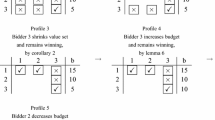Abstract
We study combinatorial auctions with n agents and m items, where the goal is to allocate the items to the agents such that the social welfare is maximized. We present a universally truthful mechanism with polynomially many queries for combinatorial auctions. Our mechanism and analysis work adaptively for all classes of valuation functions, guaranteeing \(\widetilde{O}(\min (d, \sqrt{m}))\)-approximation (where \(\widetilde{O}\) hides a polylogarithmic factor in m) of the optimal social welfare, where d is the degree of complementarity of the valuation functions. To our knowledge, this is the first mechanism that achieves an approximation guarantee better than \(\varOmega (\sqrt{m})\), when the valuations exhibit any kind of complementarity.
Access this chapter
Tax calculation will be finalised at checkout
Purchases are for personal use only
Similar content being viewed by others
Notes
- 1.
A valuation v is monotone, if for any \(S \subseteq T \subseteq [m]\), \(v(S) \le v(T)\).
- 2.
A valuation v is normalized, if \(v(\emptyset ) = 0\).
- 3.
A valuation v is submodular, if for any \(S, T \subseteq [m]\), \(v(S) + v(T) \ge v(S \cup T) + v(S \cap T)\).
- 4.
A valuation v is fractionally subadditive, if for any S, \(\{T_i\}\), and \(\{\alpha _i\}\), \(v(S) \le \sum \alpha _i v(T_i)\), whenever the following holds: for each \(j \in S\), \(\sum _{i: j \in T_i} \alpha _i \ge 1\).
- 5.
A valuation v is subadditive, if for any \(S, T \subseteq [m]\), \(v(S) + v(T) \ge v(S \cup T)\).
- 6.
\(\widetilde{O}\) hides a \(\mathrm {polylog}\,m\) factor.
- 7.
One may argue that running the state-of-the-art mechanism for each class of valuations with constant probability achieves the best approximation guarantee for all classes simultaneously. The point we try to make here is, we show how one can achieve this adaptivity with coherent design and analysis, which arguably provides more insight into the problem, and is more likely to inspire future research on the topic.
- 8.
As suggested by an anonymous reviewer, a slight modification gives all agents strict incentives to report truthfully: partition agents into two sets (\(\mathrm {STAT}\) and \(\mathrm {FIXED}\)) uniformly at random, and run a second-price auction on the grand bundle for agents in \(\mathrm {STAT}\). Then with probability 1/2, allocate the grand bundle to the highest bidder in the second-price auction, and with probability 1/2, let \(p_0\) be the highest bid, and proceed to Step 4 (the fixed-price auction) of the original mechanism.
References
Assadi, S., Singla, S.: Improved truthful mechanisms for combinatorial auctions with submodular bidders. In: Proceedings of the IEEE 60th Annual Symposium on Foundations of Computer Science (FOCS 2019), pp. 233–248. IEEE (2019)
Chen, W., Teng, S.H., Zhang, H.: Capturing complementarity in set functions by going beyond submodularity/subadditivity. In: Proceedings of the 10th Innovations in Theoretical Computer Science Conference (ITCS 2019). Schloss Dagstuhl-Leibniz-Zentrum fuer Informatik (2019)
Devanur, N., Morgenstern, J., Syrgkanis, V., Weinberg, S.M.: Simple auctions with simple strategies. In: Proceedings of the Sixteenth ACM Conference on Economics and Computation, pp. 305–322. ACM (2015)
Dobzinski, S.: Two randomized mechanisms for combinatorial auctions. In: Charikar, M., Jansen, K., Reingold, O., Rolim, J.D.P. (eds.) APPROX/RANDOM -2007. LNCS, vol. 4627, pp. 89–103. Springer, Heidelberg (2007). https://doi.org/10.1007/978-3-540-74208-1_7
Dobzinski, S.: An impossibility result for truthful combinatorial auctions with submodular valuations. In: Proceedings of the Forty-Third Annual ACM Symposium on Theory of Computing, pp. 139–148. ACM (2011)
Dobzinski, S.: Breaking the logarithmic barrier for truthful combinatorial auctions with submodular bidders. In: Proceedings of the Forty-Eighth Annual ACM Symposium on Theory of Computing, pp. 940–948. ACM (2016)
Dobzinski, S., Nisan, N., Schapira, M.: Approximation algorithms for combinatorial auctions with complement-free bidders. In: Proceedings of the Thirty-Seventh Annual ACM Symposium on Theory of Computing, pp. 610–618. ACM (2005)
Dobzinski, S., Nisan, N., Schapira, M.: Truthful randomized mechanisms for combinatorial auctions. In: Proceedings of the Thirty-Eighth Annual ACM Symposium on Theory of Computing, pp. 644–652. ACM (2006)
Dobzinski, S., Vondrák, J.: The computational complexity of truthfulness in combinatorial auctions. In: Proceedings of the 13th ACM Conference on Electronic Commerce, pp. 405–422. ACM (2012)
Düetting, P., Feldman, M., Kesselheim, T., Lucier, B.: Prophet inequalities made easy: stochastic optimization by pricing non-stochastic inputs. In: IEEE 58th Annual Symposium on Foundations of Computer Science (FOCS 2017), pp. 540–551. IEEE (2017)
Eden, A., Feldman, M., Friedler, O., Talgam-Cohen, I., Weinberg, S.M.: A simple and approximately optimal mechanism for a buyer with complements. In: Proceedings of the 2017 ACM Conference on Economics and Computation, p. 323 (2017)
Feige, U.: On maximizing welfare when utility functions are subadditive. SIAM J. Comput. 39(1), 122–142 (2009)
Feige, U., Feldman, M., Immorlica, N., Izsak, R., Lucier, B., Syrgkanis, V.: A unifying hierarchy of valuations with complements and substitutes. In: Proceedings of the Twenty-Ninth AAAI Conference on Artificial Intelligence (2015)
Feige, U., Izsak, R.: Welfare maximization and the supermodular degree. In: Proceedings of the 4th Conference on Innovations in Theoretical Computer Science, pp. 247–256. ACM (2013)
Feige, U., Vondrak, J.: Approximation algorithms for allocation problems: improving the factor of 1-1/e, pp. 667–676. IEEE (2006)
Feldman, M., Friedler, O., Morgenstern, J., Reiner, G.: Simple mechanisms for agents with complements. In: Proceedings of the 2016 ACM Conference on Economics and Computation, pp. 251–267. ACM (2016)
Krysta, P., Vöcking, B.: Online mechanism design (randomized rounding on the fly). In: Czumaj, A., Mehlhorn, K., Pitts, A., Wattenhofer, R. (eds.) ICALP 2012. LNCS, vol. 7392, pp. 636–647. Springer, Heidelberg (2012). https://doi.org/10.1007/978-3-642-31585-5_56
Mirrokni, V., Schapira, M., Vondrák, J.: Tight information-theoretic lower bounds for welfare maximization in combinatorial auctions. In: Proceedings of the 9th ACM Conference on Electronic Commerce, pp. 70–77. ACM (2008)
Nisan, N.: The communication complexity of approximate set packing and covering. In: Widmayer, P., Eidenbenz, S., Triguero, F., Morales, R., Conejo, R., Hennessy, M. (eds.) ICALP 2002. LNCS, vol. 2380, pp. 868–875. Springer, Heidelberg (2002). https://doi.org/10.1007/3-540-45465-9_74
Vondrák, J.: Optimal approximation for the submodular welfare problem in the value oracle model. In: Proceedings of the Fortieth Annual ACM Symposium on Theory of Computing, pp. 67–74. ACM (2008)
Acknowledgements
This work is supported by NSF award IIS-1814056. The author thanks anonymous reviewers for helpful feedback.
Author information
Authors and Affiliations
Corresponding author
Editor information
Editors and Affiliations
Rights and permissions
Copyright information
© 2020 Springer Nature Switzerland AG
About this paper
Cite this paper
Zhang, H. (2020). A Generic Truthful Mechanism for Combinatorial Auctions. In: Chen, X., Gravin, N., Hoefer, M., Mehta, R. (eds) Web and Internet Economics. WINE 2020. Lecture Notes in Computer Science(), vol 12495. Springer, Cham. https://doi.org/10.1007/978-3-030-64946-3_10
Download citation
DOI: https://doi.org/10.1007/978-3-030-64946-3_10
Published:
Publisher Name: Springer, Cham
Print ISBN: 978-3-030-64945-6
Online ISBN: 978-3-030-64946-3
eBook Packages: Computer ScienceComputer Science (R0)




